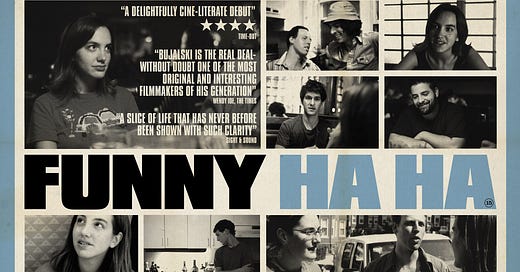*An earlier form of this was published in the movie’s Blu Ray edition’s booklet.
Funny Ha Ha
Andrew Bujalski's first movie, Funny Ha Ha, was released in 2002. I first saw it in 2008 and it remains one of my favorite movies. It has no soundtrack, crying, shouting, screaming, or, except for one mild instance, destruction. It has no angry characters. There is no sex, malicious behavior, vomiting, death, disease, politics, current events, or violence. There are no parents, babies, or non-alcohol drugs. The acting in Funny Ha Ha felt so real to me that, the first time I saw it, I kept wanting to look away from the screen because the characters’ expressions and mannerisms, their strained eye contact and ambiguous noises and “I don’t know”s and “something”s, made me, watching this alone in my room on a MacBook, feel like I was in a social situation.
The protagonist of Funny Ha Ha is Marnie, who is 23 in the beginning and 24 by the end. We see her halfheartedly trying to get a tattoo while drunk. We see her walking on a sidewalk reading a magazine. We see her starting a new job temping in an office. She jokes often and seems to dislike complaining or talking about herself. When asked, at a house party, how she is doing, she quietly mumbles she’s “losing her mind” before quickly changing the subject. I can imagine people saying this is a movie where “nothing happens,” but I outlined it as research for this essay and found that things happen continuously, with each scene priming and leading to later scenes.
My favorite scene—and arguably the climax of the 89-minute movie—occurs at 71 minutes, in Marnie’s apartment. Mitchell, a co-worker at Marnie’s former temp job, is frustrated, it seems, by Marnie’s indifference toward him romantically. He accuses Marnie of “being depressed.” Marnie says, “Well, I’m sorry. Look, I’m not even depressed—A—and B, even if I was, I mean, that’s my right.” Mitchell, played by the director, sincerely apologizes three times, sips his beer, picks up an unopened bottle, walks to the balcony, and—after around 30 seconds with the only sounds being a faraway police siren and traffic noises—underhand-tosses the glass bottle to the concrete below where it explodes.
Before Marnie responds, Mitchel is already making a complex, half-grinning, pained expression. I related to his misdirected frustration and was surprised and moved to see it portrayed in film. I liked how the scene resolved calmly, with discussion and apologies and forgiveness, instead of escalating into further conflict.
Characters in movies often seem to me like they are “being dramatic” or overreacting, but not in Funny Ha Ha.
The beer-bottle scene is somewhat mirrored around ten minutes later in the movie’s final scene, which features Marnie and Alex—her romantic interest who, by this point, seems no longer a possibility because he recently got married—and two Frisbee players. Marnie in this scene is to Alex like how Mitchell, in the other scene, was to her, except she is less aggressive and desperate than Mitchell. This overlap of emotional realities made both scenes—and all three characters—even more poignant to me. Mitchell wants Marnie, but can’t have her, and Marnie wants Alex—maybe my favorite character in the movie due to his good-natured impulsiveness and mysteriously cheerful energy—but can’t have him.
I assumed my DVD was broken when the movie ended. When I realized it wasn’t, I watched the ending repeatedly, feeling intrigued and pleased and excited. It seemed like an ending most people would strongly recommend against having. The audio was unclear. The dialogue was choppy and featured a non sequitur joke. The Frisbee players briefly appear in a strange, intruding way—one of them backwards-running on the field toward Marnie and Alex, who are seated on the grass. But then we see a shot of Marnie, a shot of Alex, and—in a cut that felt slightly different in rhythm than the rest of the movie—again a shot of Marnie, then a black screen and silent credits. The ending was like reading a story or poem that ends at the very bottom of a page, so that I don’t know I’ve read the ending until I turn the page; this is one of my favorite experiences in reading and in movies—to be surprised by an ending that, in retrospect, seems inevitable and satisfying—and Funny Ha Ha provides it extremely.
In my view, Funny Ha Ha is extreme and special in a similar manner as a group of fiction writers that journalists and other writers labeled “minimalists” in the 1970s and 1980s. In the introduction to a 1985 issue of Mississippi Review focused on minimalism, Kim Herzinger considered what minimalist fiction was about:
If "minimalist" fiction is "about" anything, it seems quite often to be "about" endurance, tracing the collision of the anarchic self and its inexplicable desires with the limitations imposed by life in the world, with special attention paid to the moment when the self confronts its limitations and decides to keep on going.
After noting that many minimalist stories began with characters experiencing "some kind of disconnection" followed by an "inevitable desire for fullness or fulfillment which is found to be impossible or inadequate,” Herzinger observed, in a passage that, for me, also applies to Funny Ha Ha:
The characters invariably face that impossibility with a kind of touching sturdiness—often suggested by calm or silence—that seems to me both accurate and revitalizing, something like human beings behaving rather well. They may not shout, they may not change the world or entertain any illusions that they can do so, but they are not, it seems to me, beaten.





gotta love mumblecore
this got me to watch "funny ha ha" and i was intrigued the whole time for the same reasons you state here that you love it. a lot is happening (even when it seems like nothing is) and all of it feels "real"